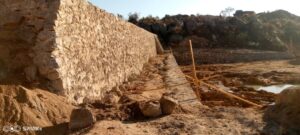Jeffrey Moyo
Residents of Nora Valley in Goromonzi, Mashonaland East province, among them smallholder farmers who have lived in the area for 60 years, have engaged the Zimbabwe Lawyers for Human Rights (ZLHR) in a land wrangle with Shengxiang Investments, a Chinese lithium miner.
The controversial purchase of the land by Shengxiang has also raised the ire of small-scale plot holders, among them dairy farmers, in the vicinity.
Some of the residents who were interviewed by NewsHub said they had lived in the area for between 30 and 60 years.
The residents want ZLHR to help them stop the lithium project for various reasons, with Allan Taylor, one of the smallholder farmers in Nora Valley, confident that “there are more than enough grounds” to halt Shengxiang operations.
They are complaining that the lithium blasting project was licensed without an environmental impact assessment having been done.
They are also concerned that it is:
- Located in the area’s water upper catchment area and is high likely to poison river and dam water that the residents and the nearby Ruwa municipality depend on
- Contributing to environmental degradation and will trigger soil erosion that would lead to river and dam siltation
- Located too close to residential and farming areas and the noise from blasting is disturbing learners at a nearby primary school
- Causing air pollution through fumes that are being emitted

On 1 June 2023, the provincial mining director for Mashonaland East wrote back to ZLHR, indicating that Shengxiang was entitled to the land since it bought it last year.
The letter indicates that the miner–which is set to displace at least six households even though the casualties could increase when it becomes fully operational—still does not have a mining licence, but just a restricted blasting one under the Mines ministry head office reference number 006442.
The correspondence to ZLHR was signed by Tendai Kashiri, the provincial mining director, who noted that the purchase of the land in question was done in accordance with Statutory Instrument 57 of 2023.
The SI amended the Base Minerals Export Control Act to allow for prospecting for and processing of base minerals that include lithium.
The purchase followed an application by Shengxiang on 16 May last year for an approved processing plant for lithium processing in the Norah Valley.
But Nora Valley residents have contended that they were never consulted when the land was sold, did the company engage the local authority as the Mines and Minerals Act requires.
Another resident farmer complained that the land takeover was “shrouded in mystery”, hence the decision to engage ZLHR.
“My late parents stayed here for over 30 years,” he said, speaking on condition of anonymity.
According to him, his parents and numerous other families were resettled on the land that was donated by a white farmer identified only as McDonald before he died.
The farner claimed that the late’s wife then secretly sold 20 hectares of the land to a Mutangadura without notifying the occupiers.
Subsequently, he said, Mutangadura sold the same land to the Chinese firm at the centre of the controversy.
“The widow of the late Macdonald clandestinely sold the land to a Mr Mutangadura, who quickly sold it to the Chinese Lithium project.
“They (the Chinese) just popped up from nowhere without communication. They brought armed guards and equipment and commenced operations, demolitions and blasting of hills to level out the land,” he added..
Alistair Chambers, a small-scale dairy farmer residing about a kilometre away from the lithium project, said: “We operate a small dairy which is our main source of income. We are already affected by continual noise during their (Chinese miner’s) operating hours over six days a week.”
“We worry that this will be even worse when they are running properly,” Chambers told NewsHub.


Comments are closed.